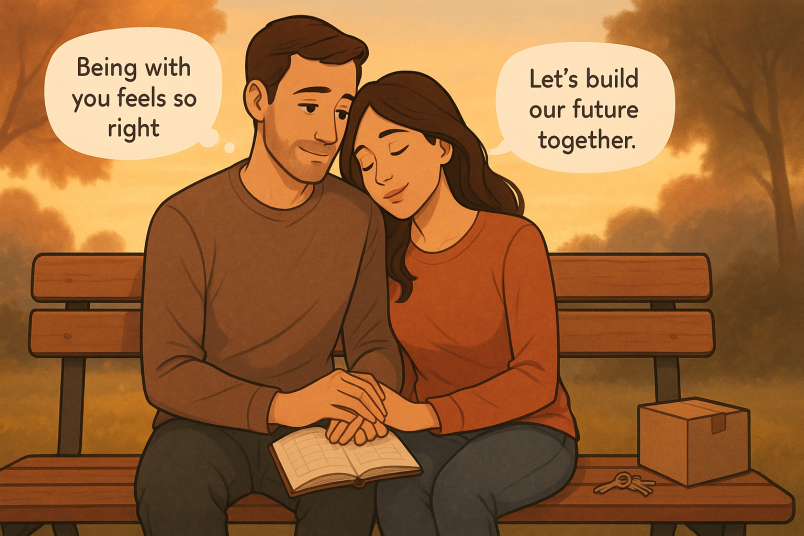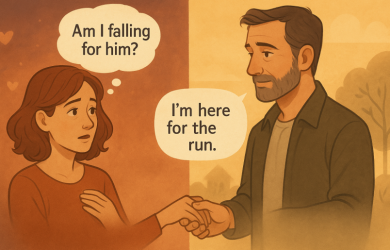Love vs Commitment: 11 Key Differences Explained

Key Takeaways
Marriage.com AI Quick Summary
Love can feel like fireworks—intense, exciting, and beautifully unpredictable—while commitment often feels like a steady hand to hold when life gets messy. Both matter deeply in relationships, yet they don’t always show up in the same way.
Sometimes you feel emotionally alive but uncertain about the future; other times, everything feels safe and stable, but passion fades. It’s easy to confuse the two—or even assume they always come together.
But understanding love vs commitment can reveal how feelings and choices shape the way we connect, grow, and stay. Let’s gently untangle these differences and explore how they each show up in real life.
What is love?
Love is a complex, multifaceted emotion characterized by deep affection, attraction, and care toward someone. It is often experienced as a powerful, sometimes overwhelming sensation that encompasses joy, connection, and a deep sense of appreciation for another person.
A research paper published in 2015 states that 100 adolescents (aged 18-22) took the Sternberg Triangular Love Scale and Relationship Assessment Scale. Correlation analysis found a significant positive link between love types and relationship satisfaction.
Falling in love can feel like an adventure; it’s exhilarating, filled with new discoveries about the other person and, importantly, about ourselves.
What is commitment?
A commitment represents a conscious choice to stick by someone, make decisions with them in mind, and prioritize their well-being and the relationship’s health over fleeting desires or immediate gratification.
According to Maggie Martinez, LCSW:
Falling in love is often motivated by emotion and chemistry, while commitment is an intentional choice.
It involves dedication, reliability, and the willingness to work through challenges together. Commitment is the foundation upon which lasting relationships are built, often growing stronger with time and shared experiences.
11 differences between falling in love and making a commitment to someone
When it comes to emotions and decisions in a relationship, one often encounters the pivotal moments of falling in love and making a commitment. These experiences, while intertwined, manifest distinct characteristics and impacts on a relationship.
Maggie Martinez highlights that:
Clinically, the difference between love and commitment lies in consistency and stability.
Understanding the difference between falling in love and commitment can profoundly influence how individuals approach their connections, offering clarity and depth.
1. Intensity v/s depth
Falling in love is marked by an intense whirlwind of emotions, a breathtaking rush that can feel all-consuming. This phase is characterized by a heightened sense of euphoria, where every moment and interaction with the person of your affection feels magnified.
On the other hand, commitment is about depth. It’s the decision to deepen your connection and weave your lives together, considering and planning for the future. It signifies transitioning from the exhilarating highs of initial attraction to a more profound, enduring bond.
- Example: Texting nonstop at 2 a.m. because you can’t stop thinking about them vs checking in during a busy day just to make sure they’re okay.
2. Uncertainty v/s security
The early stages of falling in love are often filled with uncertainty. Questions about mutual feelings, the future of the relationship, and the durability of this newfound affection are common. This uncertainty can be thrilling but also anxiety-inducing.
In contrast, making a commitment to someone is a step toward security and certainty. It’s an assurance to each other that you’re in this together, ready to face the future as a united front.
- Example: Wondering if they’ll text back after a serious conversation vs knowing they’ll respond when they can because you feel secure.
3. Idealization v/s acceptance
Falling in love often involves a degree of idealization, where one tends to see the other person through rose-colored glasses, overlooking flaws and quirks. However, commitment requires a realistic perspective.
In love vs commitment, its about accepting your partner as they are, flaws included, and loving them not despite these aspects but because of them. This shift from idealization to acceptance is crucial in balancing love and commitment, ensuring the relationship is grounded in reality rather than an illusion.
- Example: Believing they’re perfect and ignoring flaws vs seeing their imperfections and loving them anyway.
4. Passion v/s partnership
The initial stages of falling in love are driven by passion. This passion is not just physical but emotional and intellectual, sparking intense feelings and a desire to be close to the other person.
However, making a commitment shifts the focus toward partnership. It involves building a life together, sharing responsibilities, and supporting each other’s goals and dreams.
The transition from passion to partnership marks a significant milestone in falling in love vs. commitment, highlighting the evolution from a desire-driven to a decision-driven bond.
- Example: Wanting to stay up all night talking because you’re obsessed with them vs staying up late to help them with something important.
5. Discovery v/s development
Falling in love is largely about discovering and learning about each other’s likes, dislikes, hopes, and fears. Each new revelation can deepen the attraction and strengthen the bond. Commitment, however, is focused on development—growing together and individually within the framework of the relationship.
This distinction underscores the dynamic nature of falling in love vs commitment, emphasizing growth and adaptability as foundational to a committed relationship.
- Example: Getting excited to learn their favorite songs and stories vs supporting their growth as their dreams change over time.
6. Independence v/s interdependence
In the throes of falling in love, individuals often maintain a significant degree of independence, with the relationship being just one aspect of their lives.
Research indicates that supportive partners who nurture and facilitate action are more beneficial to recipients, while those who criticize and invalidate are less helpful. Greater support from partners predicts higher relationship quality and promotes personal growth and improvement for recipients.
However, commitment introduces a shift toward interdependence, where partners rely on each other more and make decisions with the other’s needs and the relationship’s health in mind.
The shift does not mean losing oneself in the relationship but rather finding a balance where both partners support and enhance each other’s lives. Such a balance is a key aspect of the journey from falling in love to making a commitment.
- Example: Making weekend plans without checking with them vs planning together so both of your needs are considered.
7. Spontaneity v/s planning
The spontaneity of falling in love brings excitement and unpredictability, with impromptu dates and surprise gestures adding to the allure. In contrast, commitment involves planning and working toward shared goals, whether it’s buying a home, planning for children, or supporting each other’s careers.
While spontaneity can and should remain a part of the relationship, the emphasis shifts toward creating a stable future together, highlighting the signs of falling in love versus commitment.
- Example: Planning a surprise road trip at midnight vs sitting down to map out future goals and responsibilities together.
8. Emotional surge v/s emotional stability
Falling in love is characterized by an emotional surge, a roller coaster of feelings that can vary from exhilarating happiness to intense longing. Commitment, however, brings emotional stability.
It provides a secure base from which both partners can explore the world, when having a lover vs commitment question, the answer is a steady support system to return to. This stability is not about the absence of passion but about the presence of a constant, reliable love.
- Example: Feeling intense joy one day and insecurity the next vs feeling calm and supported even during stressful times.
9. Personal fulfillment vs mutual growth
In the stage of falling in love, the focus is often on personal fulfillment—how the relationship benefits and fulfills personal needs and desires.
With commitment, the focus expands to include mutual growth—how both partners can grow together and support each other’s individual journeys. This transition from personal fulfillment to mutual growth reflects a deepening understanding of what it means to be in a relationship.
The balance between nurturing personal aspirations and contributing to the relationship’s health becomes a key component of a committed partnership.
- Example: Loving how the relationship makes you feel happy and confident vs working together to help each other grow and evolve.
10. Short-term elation vs long-term satisfaction
Falling in love is often driven by short-term elation, a series of moments that bring intense joy and excitement. This phase is about the immediate pleasure derived from being with the other person. On the flip side, making a commitment is about aiming for long-term satisfaction.
Maggie Martinez Schulz adds that:
Understanding the difference between falling in love and committing allows couples to work through challenges with clarity.
Love vs commitment includes not only maintaining the romantic and emotional connection but also addressing practical aspects of life together. The focus shifts from having a lover vs commitment dating to the enduring contentment of a shared life.
- Example: Feeling butterflies every time they walk in the room vs feeling grateful waking up beside them years later.
Watch this TED Talk by Maya Diamond, a relationship coach, who shares how healing past wounds and secure attachment build lasting, healthy relationships.
11. Fantasy vs. reality
Falling in love can sometimes exist in fantasy—dreaming about the “perfect” future together while overlooking real-life challenges.
Commitment, however, is rooted in reality. It involves facing bills, schedules, disagreements, and responsibilities while still choosing each other every day. The shift from fantasy to reality reveals whether love can stand strong when life gets real.
- Example: Dreaming about a picture-perfect future together vs working through real-life challenges like finances, chores, or misunderstandings as a team.
FAQs
Love vs commitment can raise various questions about their interplay and significance in relationships. Here, we address some frequently asked questions to offer clarity and insight into these pivotal aspects of connecting with others.
-
Which comes first, love or commitment?
Typically, love precedes commitment. Love is the emotional foundation that inspires partners to consider making a lasting commitment. However, the progression can vary, with commitment sometimes deepening the emotional connection and love between partners.
-
Can you commit to someone without loving them?
Yes, committing to someone without the emotional depth of love is possible. Such commitments may be based on practical reasons, shared goals, or responsibilities. Over time, a deeper emotional connection and love may develop within this framework of commitment.
-
Is falling for someone the same as falling in love?
Falling for someone can be the initial phase of attraction and interest, often the precursor to falling in love. While it includes admiration and fondness, falling in love encompasses a deeper emotional bond, commitment, and the desire to build a life together.
Lasting love
Love may ignite the connection, but commitment is what keeps it alive through every season. Falling in love brings excitement, passion, and possibility—yet long-term happiness comes from choosing each other with intention, patience, and understanding.
When couples move from emotions to actions, from fantasy to reality, and from independence to partnership, their bond grows stronger and more resilient. Love vs commitment isn’t about choosing one over the other—it’s about letting both work together.
Because the most beautiful relationships don’t just happen… they are built, nurtured, and chosen every day.
 Tips
Tips
Write your tip or submit a video tip
All tips are reviewed before the publishing.
Share this article on
Want to have a happier, healthier marriage?
If you feel disconnected or frustrated about the state of your marriage but want to avoid separation and/or divorce, the marriage.com course meant for married couples is an excellent resource to help you overcome the most challenging aspects of being married.
Recent Articles
Related Quizzes
 We'd love your feedback!
We'd love your feedback!
 Expert Q&A
Expert Q&A
Ask your question related to this topic & get the support you deserve from experts.



















 Thanks for your feedback!
Thanks for your feedback!